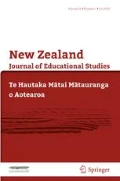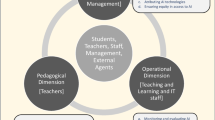Abstract
Information and Communication Technology (ICT) use in academic practice has progressed rapidly in the last decade. Nevertheless, it’s use has been taken-for-granted and/or overlooked in academic practice, especially in doctoral research. This pilot study was carried out in 2017, with the aim to examine PhD supervisors’ and PhD students’ assumptions about ICT use and their daily ICT practice in their doctoral supervision/research at a school which only offers graduate programme in a New Zealand university. Data were gathered through participative drawings in which three volunteering PhD supervisors and students reflected on their ICT use in their research. In addition, individual discussions were held, exposing their perspectives of ICT use in this domain for a duration of 12 weeks. A thematic analysis, focused on participants’ perceptions of their ICT use in doctoral research, was conducted. Findings suggest that participants required greater support to enhance their ICT use which was associated with low “e-literacy”. It is evident that the roles of ICT in higher education need to be re-investigated, particularly to support efficient and effective ICT use for doctoral research. The study advocates for a shift to a new understanding of doctoral study schema in higher education by evolving a mutual understanding of ICT use among institutions, PhD supervisors, and PhD students in the doctoral research.




Similar content being viewed by others
References
Blignaut, A. S., & Els, C. J. (2010). Comperacy assessment of postgraduate students’ readiness for higher education. The Internet and Higher Education, 13(3), 101–107. https://doi.org/10.1016/j.iheduc.2010.02.007
de Beer, M., & Mason, R. B. (2009). Using a blended approach to facilitate postgraduate supervision. Innovations in Education and Teaching International, 46(2), 213–226. https://doi.org/10.1080/14703290902843984
Devecchi, C. (2019). Working with PhD students to build their transferability and researcher skills in the FEASST@8 and SuCCEED@8 projects. New Directions for Adult & Continuing Education, 2019(163), 133–145. https://doi.org/10.1002/ace.20347
Dowling, R., & Wilson, M. (2017). Digital doctorates? An exploratory study of PhD candidates’ use of online tools. Innovations in Education and Teaching International, 54(1), 76–86. https://doi.org/10.1080/14703297.2015.1058720
Griffiths, J. R., & Brophy, P. (2005). Student searching behavior and the web: Use of academic resources and Google. Library Trends, 53(4), 539–554.
Henderson, M., Selwyn, N., & Aston, R. (2017). What works and why? Student perceptions of “useful” digital technology in university teaching and learning. Studies in Higher Education, 42(8), 1567–1579.
Inskip, C., & Donaldson, S. (2018). On the move: transitioning information skills into the workplace. Society for Research into Higher Education (SRHE) Webinar Series
Jackson, M. (2005). The impact of ICT on the development of information literacy by students in further education. Journal of eLiteracy, 2, 15–26.
Kang, S. P., Svihla, V., Law, V., & Grassberger, R. (2016). Human performance technology blooms in the high desert. Performance Improvement, 55(3), 24–34. https://doi.org/10.1002/pfi.21562
Lawlor, B., & Donnelly, R. (2010). Using podcasts to support communication skills development: A case study for content format preferences among postgraduate research students. Computers & Education, 54(4), 962–971.
Lepp, L., Remmik, M., Karm, M., & Leijen, A. (2013). Supervisors’ conceptions of doctoral studies. Trames, 17(4), 401–415.
Maor, D., & Currie, J. K. (2017). The use of technology in postgraduate supervision pedagogy in two Australian universities. International Journal of Educational Technology in Higher Education, 14(1), 1–15.
Maor, D., Ensor, J. D., & Fraser, B. J. (2016). Doctoral supervision in virtual spaces: A review of research of web-based tools to develop collaborative supervision. Higher Education Research and Development, 35(1), 172–188.
Mayring, P. (2000). Qualitative content analysis [28 paragraphs]. Forum: Qualitative social research, 1(2), Art. 20 Retrieved from http://nbn-resolving.de/urn:nbn:de:0114-fqs0002204
McCarthy, J. (2012). International design collaboration and mentoring for tertiary students through Facebook. Australasian Journal of Educational Technology, 28(5), 755–775.
McKavanagh, C., Bryant, K., Finger, G., & Middleton, H. (2004). Information and communication technologies and higher degree research supervision. In Transforming Knowledge into Wisdom Holistic Approaches to Teaching and Learning. Proceedings of the 27th HERDSA Annual Conference. Miri, Sarawak. Milperra, Australia: HERDSA
Nasiri, F., & Mafakheri, F. (2015). Postgraduate research supervision at a Ddstance: A review of challenges and strategies. Studies in Higher Education, 40(10), 1962–1969.
Oliver, M. (2011). Technological determinism in educational technology research: Some alternative ways of thinking about the relationship between learning and technology. Journal of Computer Assisted Learning, 27(5), 373–384.
Onilude, O. O., & Apampa, O. R. (2010). Effects of information and communication technology on research and development activities: The FIIRO Experience. Retrieved June, 2013, from http://www.webpages.uidaho.edu/~mbolin/onilude-apampa.htm
Orellana, M. L., Darder, A., Pérez, A., & Salinas, J. (2016). Improving doctoral success by matching PhD students with supervisors. International Journal of Doctoral Studies, 11, 87–103.
Petre, M. (2010). What works for you? Digital technologies for doctoral dialogues. ACM Inroads, 1(4), 20–21.
Petre, M., Minocha, S., & Barroca, L. (2014). Digital technologies for doctoral dialogues at a distance. Paper presented at the Frontiers in Education Conference, Madrid
Silverman, D. (2001). Interpreting qualitative data (2nd ed.). . Sage.
Sim, K. N. (2016). An investigation into the way PhD students utilise ICT to support their doctoral research process (Doctor of Philosophy). University of Otago.
Snowden, A. (2014). Against intimacy: Focusing on the task in hand in PhD supervision. British Journal of Nursing, 23(21), 1126–1132.
Stein, S. J., & Sim, K. N. (2020). Enhancing the roles of information and communication technologies in doctoral research processes. International Journal of Educational Technology in Higher Education, 17, 34. https://doi.org/10.1186/s41239-020-00212-3
Sultan, N. (2010). Cloud computing for education: A new dawn? International Journal of Information Management, 30(2), 109–116.
Sussex, R. (2008). Technological options in supervising remote research students. Higher Education, 55(1), 121–137.
Sutton, A. M., & Jacoby, J. (2008). A comparative study of book and journal use in four social science disciplines. Behavioral & Social Sciences Librarian, 27(1), 1–33.
Thomas, D. R. (2006). A general inductive approach for analyzing qualitative evaluation data. American Journal of Evaluation, 27(2), 237–246.
Wetton, N. M., & McWhirter, J. (1998). Images and curriculum development in health education. In J. Prosser (Ed.), Image-based research: A sourcebook for qualitative researcher (pp. 263–283). Falmer Press.
Zhou, E., & Okahana, H. (2019). The role of department supports on doctoral completion and time-to-degree. Journal of College Student Retention: Research, Theory & Practice, 20(4), 511–529. https://doi.org/10.1177/1521025116682036
Acknowledgements
Different part of this study have been presented at the following: Sim, K. N., & Stein, S. (2019, November). Is ICT use in higher education transforming lives and societies? Paper presented at the World Conference on Online Learning, Dublin, Ireland. Sim, K. N. & Stein, S. (2019, July). ICT: Challenge, change or opportunity in doctoral research processes? Paper presented at the Higher Education Research and Development Society of Australasia (HERDSA) Conference, Auckland, New Zealand. Sim, K. N. (2018, April). ICT use in the doctoral research process: Whose call? Paper presented at the 2018 Quality in Postgraduate Research Conference, National Wine Centre, Adelaide, Australia. Sim, K. N. (2017, October). The role of ICT in 21st Century doctoral supervision/study. Paper presented at the E-Learn Conference, Vancouver, Canada.
Author information
Authors and Affiliations
Corresponding author
Additional information
Publisher's Note
Springer Nature remains neutral with regard to jurisdictional claims in published maps and institutional affiliations.
Rights and permissions
About this article
Cite this article
Sim, K.N. ICT Use in Doctoral Research. NZ J Educ Stud 57, 253–267 (2022). https://doi.org/10.1007/s40841-021-00208-1
Received:
Accepted:
Published:
Issue Date:
DOI: https://doi.org/10.1007/s40841-021-00208-1




